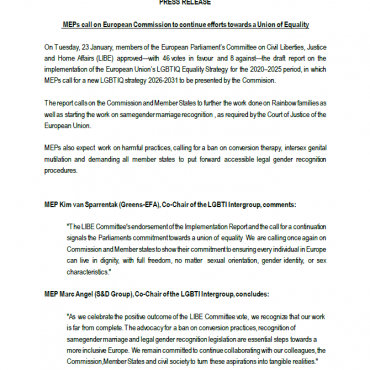Historic vote extends EU asylum standards to transgender people
Today the European Parliament formally adopted a new set of asylum rules for the European Union. The binding rules now include gender identity as a ground of persecution, which EU Member States must take into account. Governments have already agreed to the changes, which are final.
 Until now, EU asylum law foresaw that “gender related aspects might be considered” by national asylum authorities when examining the potential persecution of specific social groups in their country of origin.
Until now, EU asylum law foresaw that “gender related aspects might be considered” by national asylum authorities when examining the potential persecution of specific social groups in their country of origin.
The resolution adopted today has replaced this text, and now specifies that “gender related aspects, including gender identity, shall be given due consideration”.
The text now refers to gender identity specifically, and obliges Member States to consider gender-related aspects. Before, EU countries could still choose not to consider aspects linked to the applicant’s gender in asylum claims.
The text applies to all EU Member States except the United Kingdom, which opted out of EU asylum policies. The resolution was successfully drafted and negotiated by Jean Lambert (pictured), a British Member of the European Parliament in the Greens/EFA group.
This is the first time a binding EU Directive includes gender identity.
Dennis de Jong MEP, Vice-president of the LGBT Intergroup and responsible for asylum policies in the GUE/NGL group, commented: “Around the world, transgender people can be persecuted for who they are. This reviewed Directive will recognise the danger they face, and it will commit EU Member States to taking gender identity into account in asylum claims. I hope in a future revision it will also become mandatory to consider the sexual orientation of applicants.”
Sirpa Pietikäinen MEP, Vice-president of the LGBT Intergroup, added: “I am very proud that my colleagues from the centre-right EPP group supported this change, regardless of the views they hold on asylum in general. The European Union is only starting to recognise gender identity as a ground of persecution, but I hope today’s vote will help protect more lives.”
The binding rules will apply after they are transposed into EU Member States’ national law, except for the United Kingdom, Ireland and Denmark which opted out of the process. Due to access the EU in July 2013, Croatia is also expected to adapt its asylum laws.
Updated at 17:00 CET






